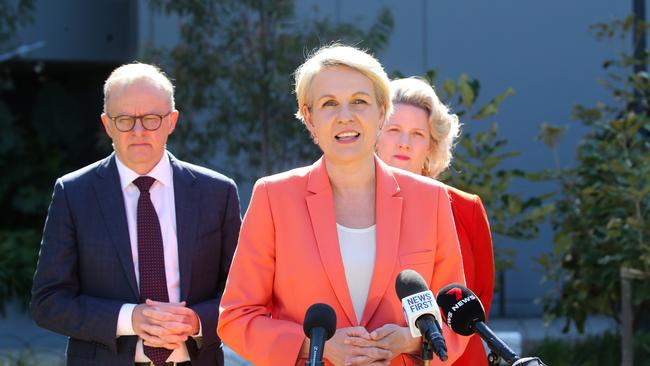Labor approves three coalmine extensions in Hunter Valley
The decision will bolster employment in a region set to be up-ended by Australia’s energy transition, but will stir the ire of environmentalists.

The Albanese government has approved the extension of three coalmines in the Hunter Valley in a move that will grow employment opportunities in the region but is likely to inflame environmentalist groups.
Federal Environment Minister Tanya Plibersek has approved Whitehaven Coal’s Narrabri Underground Mine Stage 3 Extension Project, the MACH Energy Mount Pleasant project and Ashton Coal Operations’ Ravensworth Underground Mine.
Ms Plibersek said the rulings underscored the government’s sensible decision making.
“The Albanese government has to make decisions in accordance with the facts and the national environment law – that’s what happens on every project, and that’s what’s happened here,” Ms Plibersek said.
“The government will continue to consider each project on a case-by-case basis, under the law. These are not new projects. These three approvals are all extensions of existing operations.”
The Australian understands emissions from these projects will be covered by the Safeguard Mechanism, and sources close to the government stressed the extensions to the mins were relatively minor.
The MACH Energy project deepens part of the existing mine, builds a road and extends the life of the mine. No koala habitat will be cleared, the government stressed.
The government said there would also not be any clearing at Yancoal’s Ashton facility, while it has placed what it described as “strict” limits on clearance in areas of habitat for listed threatened species including koalas.
Despite the government stressing the limited clearing that would be undertaken, environmentalists are unlikely to be swayed and widespread environmental condemnation is likely.
Critics have accused the government of paying lip service to its commitment to reduce emissions by 43 per cent by 2030 and net zero by 2050 by approving extensions in the past.
Carmel Flint, a spokesman for the anti-gas Lock the Gate Alliance said the Albanese government has with these decisions shown a “reckless disregard for the extinction of Australian wildlife and the effects of catastrophic climate change on all Australians”.
“It is shameful that a government supposedly committed to net-zero emissions by 2050 has approved thermal coalmines, the most polluting fossil fuel on the planet, to operate until 2058, 2064 and 2066. Australians will pay the price of this decision for generations to come.”
Ms Plibersek drew the ire of environmentalists earlier this month when she rejected efforts to amend environment law to consider the damage of climate change when making decisions about new and expanding coalmines.
Environmentalists earlier this year sought to challenge the validity of Ms Plibersek’s decision to approve the expansion of a Queensland coalmine in the Federal Court – underscoring the depth of community sentiment.
The government insists it is committed to meeting its emission-reduction targets and highlights strict action, most notably its Safeguard Mechanism, which requires Australia’s largest 215 emitters to reduce carbon dioxide emissions by around 5 per cent each year.
By approving the coalmine expansions, the Albanese government is also moving to bolster new job opportunities in the region, which is expected to be hit hard by Australia’s move away from fossil fuels.
Coal has historically been a major employer in the Hunter Region and it remains deeply popular in the local community, and Labor will hope its support will safeguard the seat when Australia returns to the polls by May 2025. Coal was used by several large power stations in the region, but AGL Energy shut its Liddell Coal power station last year, while Bayswater and Origin Energy’s Eraring coal power station are also expected to shut down in just a few years, leading to jobs losses and community disruption.
In contrast, coal remains desired internationally and the Port of Newcastle is Australia’s largest exporter of the commodity.
The three expanded coalmines will have easy access as a result to lucrative export markets and proponents insist that if it doesn’t supply the fuel source, other countries, with less onerous emission requirements, will step in.





